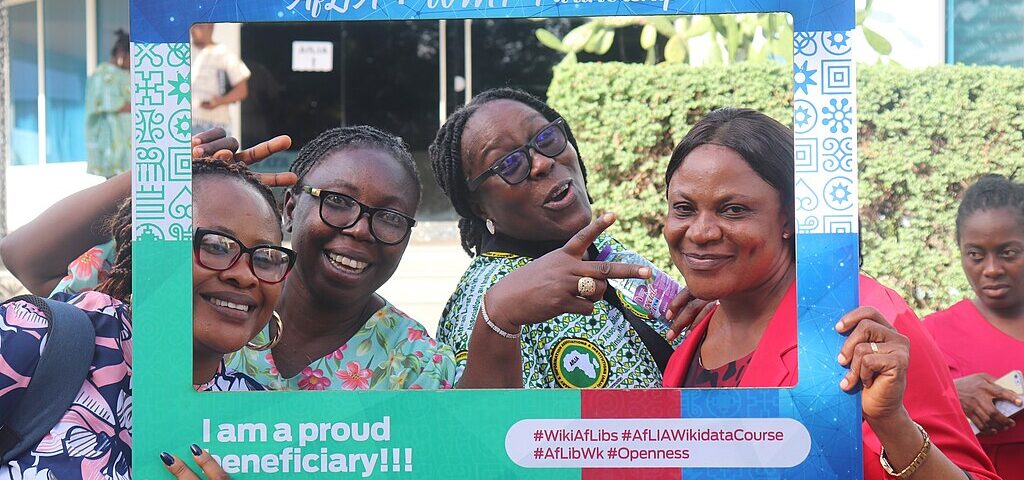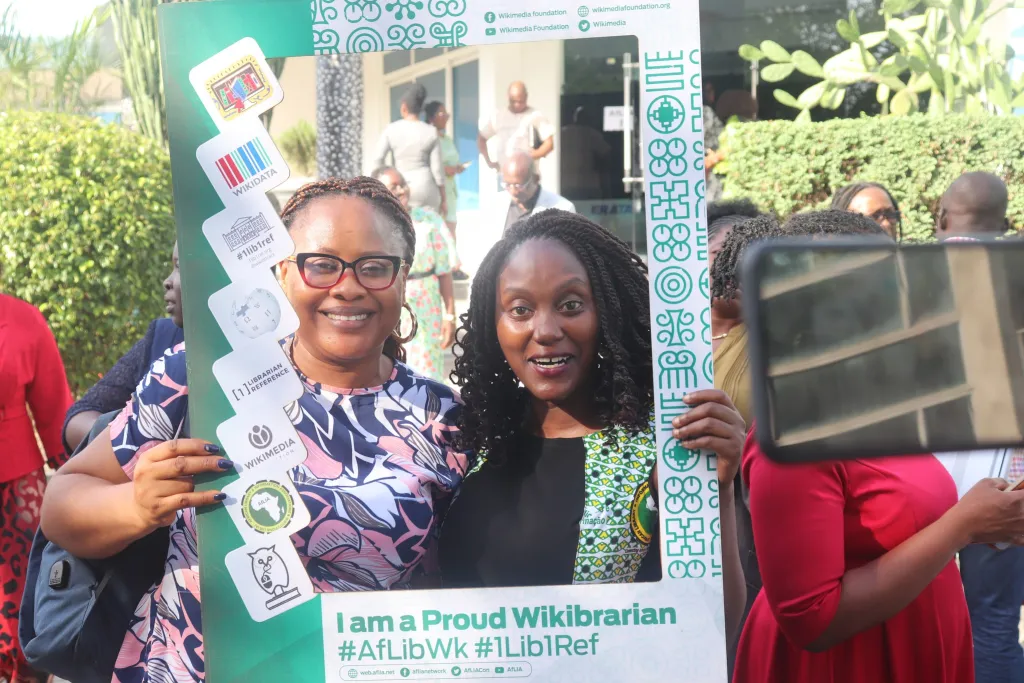African Librarians empowered to share knowledge and enhance information visibility through AfLIA Wikidata Online Course

19 DECEMBER 2023 | REPUBLISHED FROM DIFF
“I am grateful to AfLIA and the Wikimedia Foundation for making it possible for me to become a competent wikidata editor. Kudos to our trainers despite the multiple and busy schedules, they never gave up on us….. Continue providing such trainings because they are a vehicle for us to preserve our knowledge as society be it cultural, social, political through documenting such. Thank you for this opportunity to train and build our capacity on Wikidata. For this cohort 2, it’s been a great learning, skills-building and networking adventure. If there are more opportunities like this I would love to be part of every single one of them”
– A participant from Zambia, expressing her sentiments as she concluded an anonymized post-training evaluation survey.
This testimonial sums up how amazing the AfLIA Wikidata Online Course was for everyone involved. AfLIA executed the course, officially named the “Promoting Open Knowledge Practices in African Libraries through Wikidata” project, with support from a mission-aligned grant provided by the Wikimedia Foundation, aimed to address the critical issue of limited access to African knowledge. By training African library and information professionals how to use Wikidata, the course made library collections more visible and helped to close the knowledge and gender gap on Africa. It ran from July 2022 to October 2023. This article summarizes the outcomes and key learnings gleaned from the project’s post-training evaluation survey.
Taking inspiration from available training materials and lots of brainstorming within the Wikimedia world, the project created a comprehensive curriculum tailored specifically for the African context. This curriculum focused on structured and linked data practices, highlighting the ideal platform for exploring these concepts: Wikidata. A dedicated team of four experienced African Wikimedians editors collaborated to build the 8-10 week virtual course which was deployed in both English and French.
Two experienced course facilitators administered and facilitated the program. To maximize learner engagement and support, the course implemented diverse strategies, including; access comprehensive learning materials, weekly live training and virtual learning circle sessions, open communication channels (Moodle, WhatsApp, and email) for seamless communication and interaction, providing recordings for missed live sessions and a flexible 2-cohort system allowing re-enrollment for those unable to complete the course. Additionally, the project organized a pre-conference workshops and edit-athons organized as part of the 5th AfLIA Conference and 7th African Library Summit in Accra, Ghana, fostering closer connections between librarians and the Wikimedia user communities across Africa.

Diversity in course participation
The AfLIA Wikidata Online Course reached a diverse range of participants from across Africa and beyond. Participants hailed from all African sub-regions and some international locations including Botswana, Cameroon, Egypt, The Gambia, Germany, Ghana, India, Kenya, Lesotho, Malawi, Namibia, Nigeria, Rwanda, South Africa, Uganda, Zambia, and Zimbabwe. Other participants came from Benin, Cameroon, Democratic Republic of Congo, Cote D’Ivoire, Morocco, Senegal, and Togo. The diverse representation highlights the project’s inclusivity and its potential to spread awareness of Wikidata. Notably, 58.7% were female and 69.2% had no prior experience with Wikidata.
The findings of the post training evaluation show that, after the training, approximately 54% of the participants believed they had an intermediate knowledge and competence with Wikidata, while 32.6% considered themselves advanced users of Wikidata after the course. Only 14% of the respondents perceived their capacity or competence at the beginner level.
Although about 25% of active participants could not complete the course, all participants gained significant exposure and training, even if they only acquired basic skills. Despite challenges like unstable internet and conflicting schedules, participants ended the course with an average knowledge and competence level between intermediate and advanced.
Participants demonstrated competence across various Wikidata tasks including; editing, using tools like SourceMD and QuickStatements, querying data, visualizing and analyzing results from Wikidata queries through off-wiki tools like Scholia and collaborating online. The training successfully equipped participants to enhance library metadata, improve discoverability, and contribute to research and teaching.
One participant had this to say;
“First, I liked the Query Builder, which enables one to get answers for one’s research questions, reveals gaps, and prompts one to act appropriately and well-informed, as it is a way of verifying accuracy, reliability, credibility, and authenticity of answers given. Secondly, after the use of the query service, being able to…… display the results in a format that makes sense to analyze data, such as a table, spreadsheet, graph, photo, and including text, etc. Thirdly, I very much enjoyed identifying scholarly publications that were not included in the Scholia tool using SourceMD and the Quickstatements tool and adding to it, thereby contributing to building a scholarly profile. Last but not least, I enjoyed learning querying and visualizing using the tools Reasonator and Scholia, as already mentioned above.”
Applying new knowledge and skills
When asked how they would use their new Wikidata skills, participants overwhelmingly said they wanted to share their knowledge with other library folks and make Wikidata a regular part of their daily work.
The course has turned librarians into knowledge superheroes, eager to share their newfound skills with everyone around them. They plan to organize workshops, training sessions, and even edit-a-thons to show their colleagues, students, and community members how awesome Wikidata is. By working together and learning from each other, they will make information more visible, improve how data is used, and even get students excited about open knowledge platforms. Their commitment to helping others proves that Wikidata is a powerful tool for research, data, and building knowledge together. Basically, these librarians are on a mission to make Africa a more informed and connected place, bridging the gap between the old-school library and the digital world.
Furthermore, participants are excited to apply their newfound skills in their daily work, including cataloging, creating metadata, and enhancing research visibility. They see Wikidata as a powerful tool to make their library collections more discoverable, increase the reach of scholarly resources, and boost the profiles of researchers.
Key takeaways include plans to actively contribute to Wikidata by editing, creating items, and linking their holdings to Wikidata entries. This aims to make library information more visible and enhance the discoverability of resources. Specific applications include using SourceMD to increase the visibility of African scholarly work online, adding valuable items from their programs, and updating library information on Wikidata.
Additionally, participants plan to fill in information gaps on Wikidata relevant to their libraries and communities, ensuring comprehensive and up-to-date information about their resources. Beyond individual contributions, participants are dedicated to promoting African work online, raising awareness about Wikidata, and seeking support from policymakers and community leaders to advance Wikidata’s goals.
One of the participants shares in detail, his thoughts on how the new skillset will be applied:
“After completing this Online Wikidata course, I am excited to integrate the acquired knowledge and skills into my professional work in several ways. Firstly, I plan to leverage Wikidata’s extensive database to enhance the quality and accuracy of data in my projects. This will not only streamline my research process but also improve the overall credibility of my work. Additionally, I see great potential in utilizing Wikidata for data visualization and analysis. The structured nature of Wikidata will enable me to extract meaningful insights and trends, which can inform strategic decision-making in my field. Furthermore, I aim to contribute to the Wikidata community by adding and editing information, thereby giving back to the wider knowledge-sharing ecosystem. Lastly, I intend to explore opportunities for collaboration and networking within the Wikidata community. Engaging with experts and enthusiasts will not only expand my own understanding but also foster a collaborative spirit in my professional endeavors. Overall, I am confident that the knowledge gained from this course will be a valuable asset in advancing my work and contributing positively to the broader knowledge landscape.”
Recommendations for future initiatives
Based on the feedback during implementation phase of the training program, here are some useful recommendations for refining future online training initiatives, particularly in developing and underrepresented regions.
To maximize effectiveness, organizers are encouraged to adopt a blended learning approach, combining in-person and virtual sessions. This leverages the benefits of both formats, with at least one in-person session promoting deeper understanding and fostering community spirit.
Recognizing the time constraints of training programs, the provision of refresher and recovery sessions is crucial. These sessions allow participants to address challenges, catch up on missed content, and solidify their learning. Additionally, establishing post-graduation interaction channels fosters a sense of community and continuous learning, a key element of AfLIA’s training initiatives.
Furthermore, acknowledging participants’ challenges, such as work, internet, and power disruptions, is crucial. By offering flexibility in submission deadlines, organizers can ensure a fair and inclusive learning experience. Finally, incentivizing participants with internet data vouchers helps overcome cost barriers and promotes active engagement in virtual courses. These recommendations serve as a valuable roadmap for continual improvement, ensuring future online training initiatives in developing regions are even more successful and impactful.
Conclusion
Over 200 library and information professionals, initially with minimal knowledge of Wikidata, transitioned into intermediate and advanced users through the course. The tangible impact of this training was evident in the 2023 African Librarians Week, marked by a substantial increase in contributions to Wikidata. This achievement aligns with the global 1Lib1Ref initiative and emphasizes the course’s role in promoting African librarians’ engagement in Wikimedia projects.
The success stories underscore the transformative potential of targeted and innovative training programs, emphasizing the crucial role of empowering librarians in the digital era. Thanks to the Wikimedia Foundation for providing funds for this project and to the project team, training facilitators, participants, and any supporting partners for their contributions to this initiative’s success.
_________
- Read the post-training report for more detailed insights – [https://web.aflia.net/wp-content/uploads/2023/11/Pre-post-training-report_-AfLIA-Wikidata-Online-Course-2023.pdf]
- Learn more about the project on Meta Wiki –[https://meta.wikimedia.org/wiki/Grants:Programs/Wikimedia_Alliances_Fund/Promoting_Open_Knowledge_practices_in_African_Libraries_through_WikiData]
